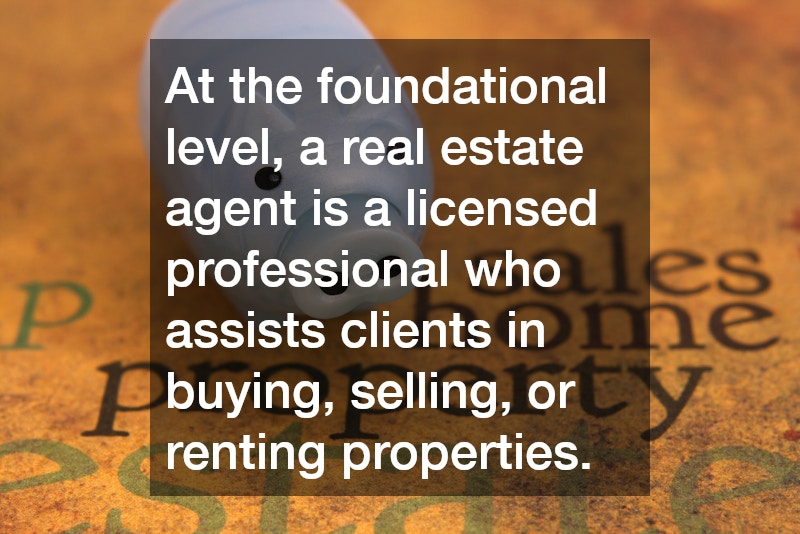
In the world of real estate, the terms “Realtor,” “agent,” and “broker” are often used interchangeably, leading to confusion among buyers and sellers alike. While all three play crucial roles in the real estate market, they serve distinct functions and have different qualifications and responsibilities. Understanding these differences is essential for anyone looking to navigate the property landscape effectively.
Real Estate Agent
At the foundational level, a real estate agent is a licensed professional who assists clients in buying, selling, or renting properties. To become an agent, one must complete a certain number of hours of real estate education, pass a licensing exam, and adhere to state laws.
While the specific requirements can vary from state to state, the general path involves:
- Education: Aspiring agents typically take pre-licensing courses that cover various aspects of real estate, including property law, finance, and ethics.
- Licensing Exam: After completing the required education, candidates must pass a state licensing exam. This test assesses knowledge of real estate laws and practices.
- Brokerage Affiliation: Agents must work under a licensed broker to legally engage in real estate transactions. This means they cannot operate independently but instead function as representatives of their broker.
Realtor
A Realtor is a real estate agent who is a member of the National Association of Realtors (NAR), a professional organization that upholds a strict code of ethics and professional standards. Not all agents are Realtors, but all Realtors are agents. To become a Realtor, an agent must:
- Join the NAR: This requires paying membership dues and committing to abide by the NAR’s Code of Ethics.
- Continued Education: Realtors often engage in additional training and education to stay updated on the latest industry trends, laws, and best practices.
- Professional Networking: Being a part of the NAR provides Realtors with networking opportunities, access to exclusive resources, and tools that can help them serve their clients better.
The distinction between a Realtor and an agent is significant. While all Realtors are agents, not all agents adhere to the same ethical standards or engage in ongoing education. For buyers and sellers, working with a Realtor can provide additional assurance regarding professionalism and ethical behavior.
Real Estate Broker
A real estate broker has completed more extensive training and education than a standard real estate agent. Brokers can operate independently, and they can also manage a team of agents. The requirements to become a broker typically include:
- Higher Education: Most states require brokers to have more education than agents, often requiring additional courses in real estate management and finance.
- Experience: Before becoming a broker, agents usually must work for a certain number of years (often two to three) under a broker’s supervision, gaining hands-on experience in the field.
- Broker’s Exam: Similar to the agent’s exam, brokers must pass a more comprehensive licensing exam that covers a broader range of topics, including real estate laws, ethics, and financial practices.
The broker’s role is multifaceted. They not only help clients buy and sell properties but also oversee agents and ensure that their team complies with legal and ethical standards. Brokers often take on additional responsibilities, including:
- Managing Transactions: Brokers handle the paperwork and legalities of transactions, ensuring everything is in order.
- Training Agents: They often provide ongoing education and training to their agents, helping them develop their skills and knowledge.
- Business Management: Brokers are responsible for the financial and operational aspects of their brokerage firm, including hiring and managing staff.
Key Differences
To summarize, here are the key differences among a Realtor, agent, and broker:
- Education and Licensing: While all three must complete certain educational requirements, brokers undergo more extensive training and testing than agents. Realtors are agents who have chosen to join a professional organization and adhere to its ethical standards.
- Professional Status: All Realtors are agents, but not all agents are Realtors. Brokers can operate independently and can also supervise agents.
- Roles and Responsibilities: Agents primarily work with clients on buying or selling properties. Realtors do the same but with a commitment to higher ethical standards. Brokers manage agents, oversee transactions, and run their business.
Conclusion
Navigating the real estate market can be complex, and knowing the differences between Realtors, agents, and brokers is a vital first step in the process. Whether you’re buying your first home, selling a property, or investing in real estate, understanding who you’re working with and their qualifications will empower you to make the best choices for your needs. Remember, effective communication and a clear understanding of roles can lead to a more successful and satisfying real estate experience.
.





